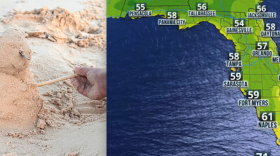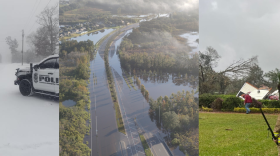One morning last July, Roman Perez pulled his truck out of his driveway in Bunkerville, Nevada, and found officers from Immigration and Customs Enforcement waiting for him.
If Perez had been arrested during the Trump administration, more than likely he would still be in detention, or deported to Mexico.
But during the Biden administration, Perez is not considered a priority for enforcement. Under enforcement guidance issued by the Homeland Security secretary last year, living in the U.S. illegally is no longer, by itself, enough reason to arrest or deport someone.
That's a big difference, says Sylvia Esparza, Perez's lawyer. "Practically speaking, it has helped a lot of people," she said in an interview.
The Biden administration points to those guidelines as a success: A tangible change that has improved the lives of immigrants all over the country, even as much of the administration's immigration agenda has been derailed by politics, or blocked by federal judges.
Now these enforcement priorities are in jeopardy too, as a legal challenge against them heads to trial this week.
"There are laws passed by the United States Congress that the president is not enforcing," said Texas Gov. Greg Abbott last month during remarks at a border security briefing. His state has been leading the legal effort against the Biden administration's border and immigration policies — often steering the cases to federal judges appointed by former President Trump.
Conservatives in Texas and elsewhere complain that the number of ICE arrests and deportations have fallen sharply. And that local jails say they've been forced to release undocumented immigrants who previously would have been picked up and detained by ICE.
But Homeland Security secretary Alejandro Mayorkas defends the new enforcement priorities.
"We will not dedicate our limited enforcement resources to apprehend individuals who have been here in this country for many years, who have been contributing members of our communities," he said in a speech last month to the U.S. Conference of Mayors.
Mayorkas says ICE is now targeting threats to public safety and national security, and exercising what's known as prosecutorial discretion by deciding which cases are worth pursuing, and which are not.
Under the new guidance, immigration authorities are supposed to consider the "totality of the circumstances" in each case — including whether an immigrant is caring for a family member, or has a potential pathway to legal status.
"Many of these mitigating or humanitarian factors are actually part of the history of prosecutorial discretion and who's been protected," said Shoba Sivaprasad Wadhia, a law professor at Penn State University who studies prosecutorial discretion, in an interview.
There's no doubt that prosecutorial discretion made a big difference for Roman Perez and his family. Perez has an old drug conviction on his record, and an immigration judge had previously ordered his removal from the U.S.
After he was arrested, Perez was detained for over a month. "They took everything out of my life in like one second," he said in an interview. "Nobody knew where I was."
While he was detained last summer, Perez worried about losing his thriving business as a handyman, and about how he would support his wife and their three children, who are U.S. citizens.
He told his 10 year-old son that he was working on a job far away, and didn't know when he would be home.
"I gotta lie to him. And he get mad at me," Perez said in an interview. "He says, 'you should come home. I don't want you to be working out of town. We don't need our money,' he said. And he's 10 years old."
Some immigrants and their advocates complain that ICE is still pursuing cases against people who should not be enforcement priorities, while the administration's critics on the right say it's taking the idea of discretion way too far.
"Prosecutorial discretion is supposed to be the exception, not the rule," said Lora Ries, a former top Homeland Security official during the Trump administration who is now with the Heritage Foundation, a conservative think-tank in Washington.
"This administration is using it as an excuse, and as the rule, to not enforce the law," Ries said in an interview.
The legal challenge from Texas and Louisiana is set to go to trial this week in Houston. It will be heard by federal Judge Drew Tipton, who was appointed to the bench by former President Donald Trump. Tipton has already tried to block the DHS guidance once before.
Copyright 2022 NPR. To see more, visit https://www.npr.org.









